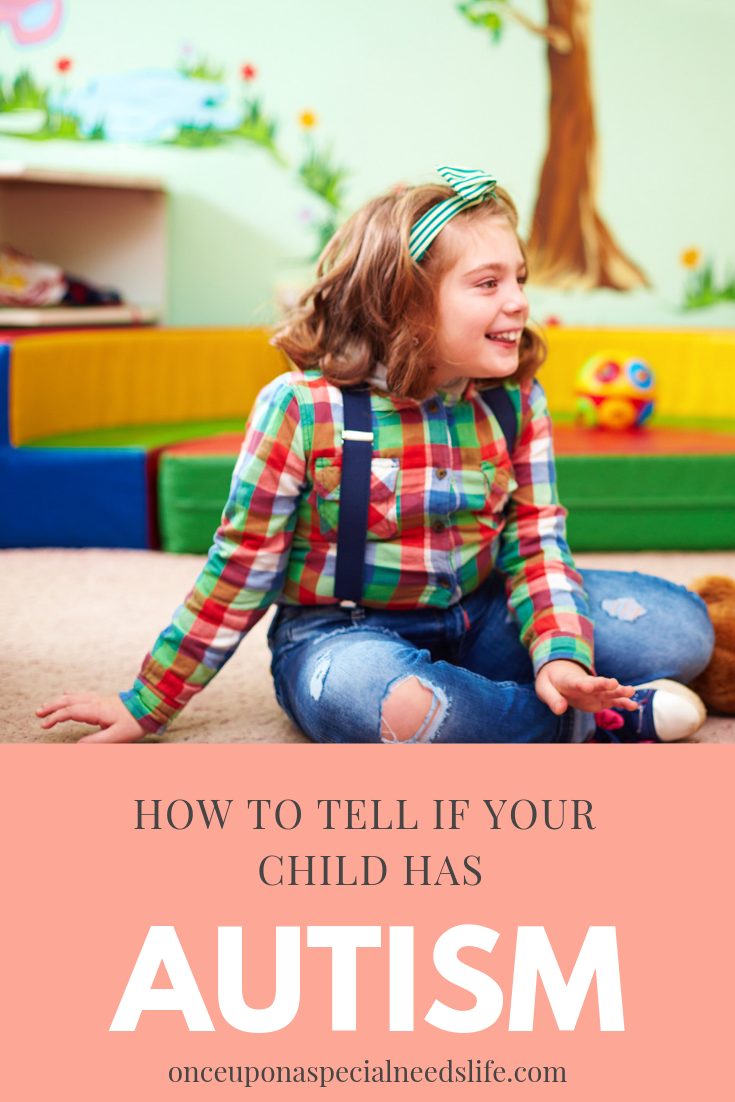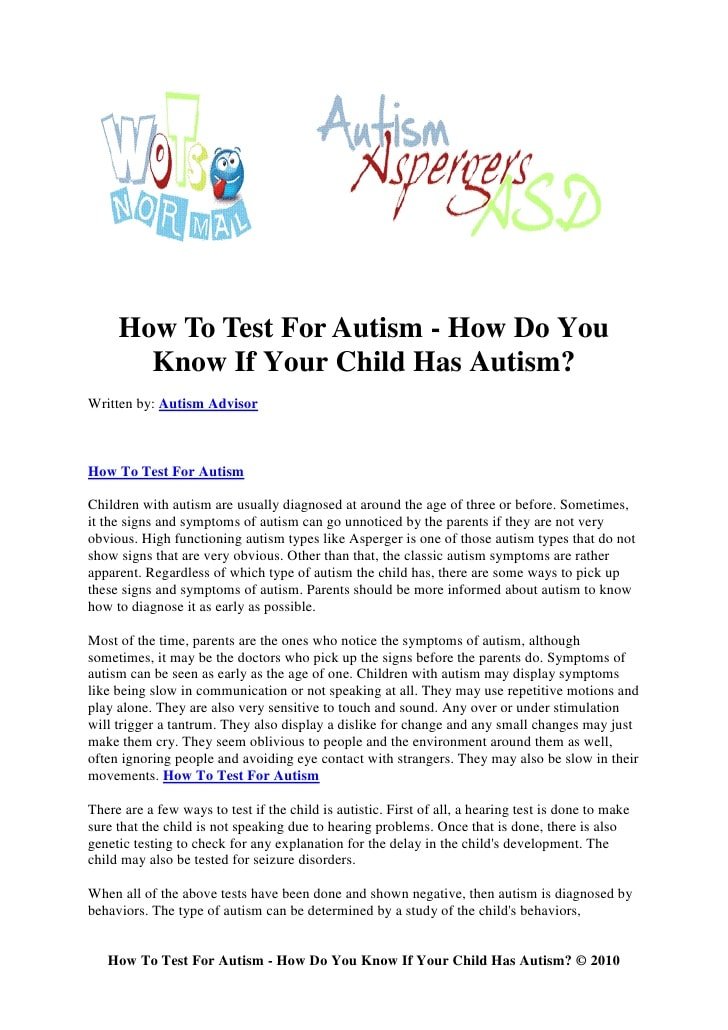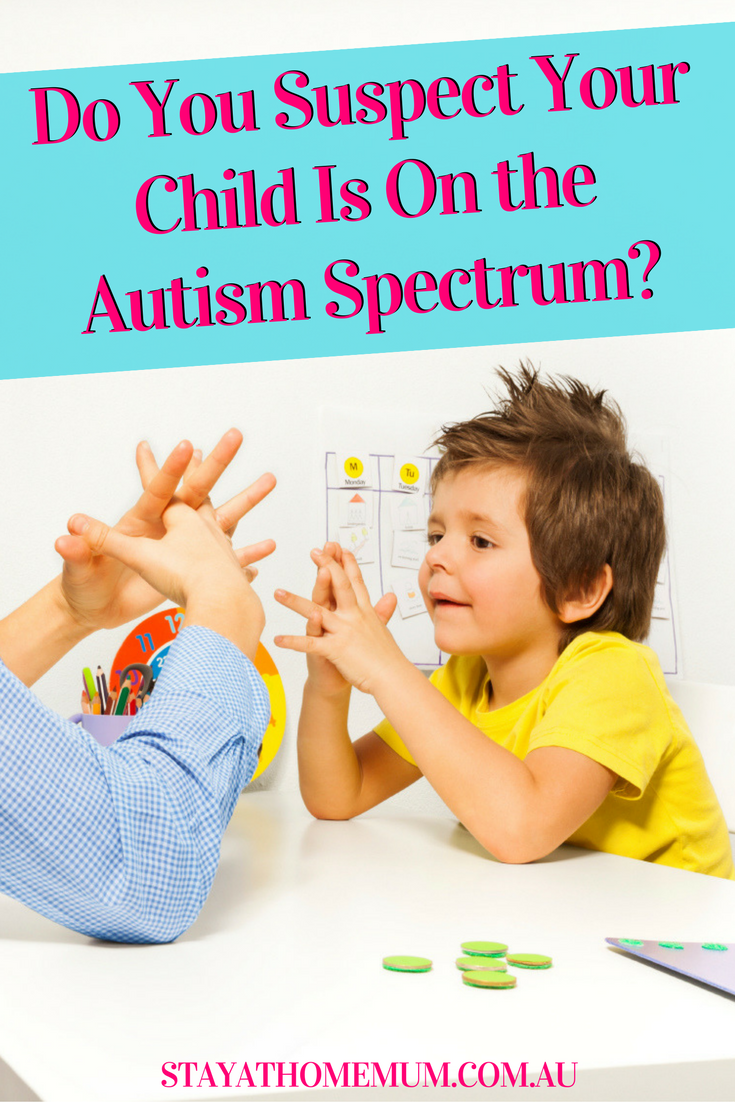Communication: Early Signs Of Autism
In the first year of life, childrens social and communication development is an important area to watch for early signs of autism. Social and communication development includes things like learning to smile, make eye contact, and use gestures.
Social interaction and communicationIf young children are autistic, they might:
- not consistently use eye contact to get someones attention for example, they might not always look at you and then at a snack to show you they want it, or not look back towards you when they see something that excites them
- rarely point to or hold up objects to show you things for example, they might not point to a dog and look back at you to make sure youve seen it too, or they might drop a toy in your lap and walk away instead of holding it up and looking at you
- not consistently respond to their name being called
- not consistently use gestures on their own for example, they might not wave bye-bye or clap without being told to, or without copying someone else whos waving or clapping
- not consistently smile at you or other familiar people without you smiling at them first
- rarely copy other peoples actions, like combing their hair when you do it
- not sound like theyre having a conversation with you when they babble
- not understand simple, one-step instructions for example, Give me the block or Show me the dog.
Relationships and playIf young children are autistic, they might:
Rarely Shares Their Interests With You
Babies are eager to share their interests with you, first with gestures like showing and pointing, and then with sounds and words.
Notice what your baby is paying attention to to figure out what theyre interested in.
If your baby rarely their interests with you, this can be an early sign of autism.
Inflexibility Signs Of Autism In Children
Autistic children are often restricted in their behaviors and movements. They are inflexible, and even obsessive in terms of their activities, behaviors and interests.
- Inflexibility, to an extent, can be an indication of ASD. The following are the signs of inflexibility
- Strict routines – insisting on taking the same route to school every day
- Limited topic of interest – memorizing the train schedules
- Repeating the same actions – flapping hands, rocking back and forth; these are also known as stimming, self stimulatory behavior
- Unusual attachments to objects – obsessively lining the trucks or arranging them in a certain order
- Difficulty in adapting to change – getting upset when their routines are interrupted
Recommended Reading: What Does The Puzzle Piece Mean
Change The Situation Completely
In some circumstances, your child’s school, your home, your activity choices, or your location may need to change.
This may sound like an extreme response, but if your child’s school is unable to serve her needs, your neighbors are intolerant, or your preferred activities are simply impossible for your autistic child, you may need to consider options such as private school, a different neighborhood, or a change in your routines.
Strong Interest In Unusual Sensory Experiences

Babies with autism can show very strong interest in unusual sensory experiences, such as excessive rubbing of certain textures, looking out the side of their eye or closely inspecting a block or toy train as it rolls by, or licking objects.
If your child shows strong interest in unusual sensory experiences, this may be an early sign of autism.
Recommended Reading: What Is The Life Expectancy Of People With Autism
What Are The Signs Of Autism
The autism diagnosis age and intensity of autisms early signs vary widely. Some infants show hints in their first months. In others, behaviors become obvious as late as age 2 or 3.
Not all children with autism show all the signs. Many children who dont have autism show a few. Thats why professional evaluation is crucial.
The following may indicate your child is at risk for an autism spectrum disorder. If your child exhibits any of the following, ask your pediatrician or family doctor for an evaluation right away:
Early Signs Of Autism In Boys
Autism is seen more prevalently in boys than in girls. Therefore, the core symptoms mostly coincide with the symptoms we have mentioned to be seen in children with autism in all ages.
Here are some of the early symptoms in autistic boys:
- Doesnt make eye contact
- Has repetitive behaviors
- Doesnt like physical contact
Recommended Reading: Symmetra Overwatch Autistic
How To Help Your Child After An Autism Diagnosis
There are many things you can do to help a child with autism spectrum disorder. Start by ensuring their treatment plan is tailored according to their individual needs and work closely with the therapists, teachers and doctors involved to make sure you are following through with the therapy at home and school. It is also important to provide children with autism with a sense of structure in their lives. Create a detailed routine for your child and stick with it. You can also create consistency at home by reinforcing things the child may have learned in other settings and using positive reinforcement to reward good behavior.
Tip : Create A Personalized Autism Treatment Plan
With so many different treatments available, it can be tough to figure out which approach is right for your child. Making things more complicated, you may hear different or even conflicting recommendations from parents, teachers, and doctors.
When putting together a treatment plan for your child, keep in mind that there is no single treatment that works for everyone. Each person on the autism spectrum is unique, with different strengths and weaknesses.
Your childs treatment should be tailored according to their individual needs. You know your child best, so its up to you to make sure those needs are being met. You can do that by asking yourself the following questions:
What are my childs strengths and their weaknesses?
What behaviors are causing the most problems? What important skills is my child lacking?
How does my child learn best through seeing, listening, or doing?
What does my child enjoy and how can those activities be used in treatment and to bolster learning?
Finally, keep in mind that no matter what treatment plan is chosen, your involvement is vital to success. You can help your child get the most out of treatment by working hand-in-hand with the treatment team and following through with the therapy at home.;
You May Like: What Kind Of Autism Does Symmetra Have
Whats The Outlook For Autistic Children
Autism is a spectrum of neurological differences that develop during childhood.
Although there is not a cure for autism, many in the autism community believe these neurological differences dont need to be cured. Theyre just a different way of communicating and interacting with the world.
Decades of research have shown that early intervention can have a powerful effect on health outcomes for autistic children. When therapies begin in early childhood, autistic children benefit from the incredible adaptability of their growing brain and nervous system.
Some signs of autism can appear during infancy, such as:
- limited eye contact
Restricted Behavior And Play
Children with Autism Spectrum Disorder are often restricted, rigid, and even obsessive in their behaviors, activities, and interests. Symptoms may include:
- Repetitive body movements ; moving constantly.
- Obsessive attachment to unusual objects .
- Preoccupation with a narrow topic of interest, sometimes involving numbers or symbols .
- A strong need for sameness, order, and routines . Gets upset by change in their routine or environment.
- Clumsiness, atypical posture, or odd ways of moving.
- Fascinated by spinning objects, moving pieces, or parts of toys .
- Hyper- or hypo-reactive to sensory input .
You May Like: Symmetra Autistic Comic
Repetitive Behaviors Interests Or Activities
Repetitive behaviors, interests or activities that may indicate autism:
- Unusual body movements: often flapping of the arms, spinning, or body rocking
- Repetitive actions like opening and closing doors, flipping light switches or assembling the same puzzle over and over again
- Playing by lining up toys or categorizing toys by colors, dropping or spinning toys
- An inability or unwillingness to pretend during play
- Showing a strong and consistent interest in one specific toy or topic ;
- Exhibiting a rigid mindset in regard to daily schedule and routines, what they wear, the location and placement of objects in the home and at school
- Refusal to wear certain types of clothing or eat certain foods
These are just guidelines. Signs in individuals who go on to be diagnosed as on the autism spectrum vary from person to person and can also vary in severity.;
However, if your child has been exhibiting several of these signs, you may want to start the process of seeking out an autism diagnosis.
You Find It Much Easier To Be Alone

Autism in many forms is distinguished by feelings of social difficulty: not quite understanding, integrating, keeping up, or doing the “right thing” in social situations. Many autistics feel, obviously, that being on their own is a much easier option. Interestingly, some scientists believe that autistics could actually have originally been early “solitary foragers,”who survived in the wild on the strength of their attention to detail and ability to see patterns rather than their social ties. It’s still early days for that hypothesis, but it’s an intriguing idea.
You May Like: What Kind Of Autism Does Symmetra Have
Signs Of Social Difficulties
- Appears disinterested or unaware of other people or whats going on around them.
- Doesnt know how to connect with others, play, or make friends.
- Prefers not to be touched, held, or cuddled.
- Doesnt play pretend games, engage in group games, imitate others, or use toys in creative ways.
- Has trouble understanding feelings or talking about them.
- Doesnt seem to hear when others talk to them.
- Doesnt share interests or achievements with others .
Basic social interaction can be difficult for children with autism spectrum disorder. Many kids on the autism spectrum seem to prefer to live in their own world, aloof and detached from others.
A Lack Of Interest In Pretend Play
For kids with autism, pretend skills may be absent or lacking. dont use objects for pretend playstuff like picking up a sponge and using it as a pretend phone, she says. Play-feeding a doll or pretending the couch is a truck or train are other examples. If this kind of pretend play hasnt started by 18 months, thats a warning sign, notes the CDC.
Don’t Miss: What Kind Of Autism Does Symmetra Have
Observing The General Characteristics
Plan Playdates And Social Time
It’s important for kids with autism to socialize with their peers, even if sometimes it can be challenging for them. Playdates and other activities are some much-needed chances to practice social skills and make new friends. Those who are struggling can sign up for a social skills group, which helps with things like introducing yourself, talking to others, reading social cues, and more.
When helping your child choose a playmate, look for someone who shares the same interests. Pre-plan the activities , and avoid places with too much noise and stimulation if you think it will overwhelm your child. Let your child know what to expect ahead of time. Consider using a visual schedule with pictures or create social stories to help “tell ahead” what will happen during a playdate.
Also Check: Dog Breed For Autistic Child
Consulting People You Know
What Can Mimic Autism
Developmental delays such as language, speech, or hearing problems can often be mistaken for autism. There are also a number of specific disorders that are characterized by similar behavioral symptoms to autism. According to the Autism Research Institute, Williams Syndrome, Fragile X Syndrome, and Landau-Kleffner Syndrome, are all closely related to autism.
Also Check: What Is The Life Expectancy Of People With Autism
Who Is This Child Autism Quiz For
Answer the quiz questions below to see if your child could have autism.
Below is a list of questions that relate to life experiences common among children diagnosed with autism spectrum disorder . Please read each question carefully, and indicate how often your child has experienced the same or similar challenges in the past few months.
Please be aware that some behaviors are developmentally appropriate for your young child and are not signs of autism.
Early Signs Of Autism In 3 Year Old

As your kid grows older, certain signs become a little bit less clear compared to the first few months. You can get a better idea by checking the developmental milestones to see if your child is behind on some.
- Some autism red flags for 3 year olds are as follows:
- Prefers being alone,
- Doesnt like physical contact
- Has difficulty in understanding feeling
- Doesnt respond when their name is called
- Is not able to form sentences
- Speaks in flat tone
You May Like: Life Expectancy With Autism
Loss Of Language Or Social Skills
Children with autism may seem unwilling to speak or verbalize even though they used to do so. For example, a baby who used to babble or make nonsense noises might stop as he gets older. Children with autism may also withdraw from social situations even though they used to seem comfortable playing with or around other kids, according to the Eunice Kennedy Shriver National Institute of Child Health and Human Development.
What Are The Signs Of Autism In Babies
Autism doesnt change a babys physical appearance. The condition does affect how babies communicate and how they relate to the world around them.
Autism is described as a spectrum condition because signs, symptoms, and abilities can vary widely. If you notice any of these developmental differences, its important to talk with your childs doctor or healthcare professional about them.
Also Check: What Is The Life Expectancy Of People With Autism
Look For Support At School
Many kids with autism spectrum disorder are diagnosed by age 3 and receive early intervention services. When they turn 3, they’re eligible for additional services at their local school district with the help of an individualized education program .
The IEP may include therapy for speech/language, behavior, or sensory concerns. In school, kids might get extra support through a classroom aide or during a “lunch bunch” or social skills group.
Parents meet with an IEP team to determine a child’s needs. While you can’t insist on certain services, you can appeal the IEP if you feel that the plan doesn’t meet your child’s needs. The IEP is reviewed and updated each year, but you can ask for updates before that to make sure your child is meeting goals.
Not all kids with autism need an IEP. Those who do not qualify for an IEP can get educational assistance through a 504 education plan, which provides for accommodations in a regular classroom that improve a child’s learning experience.
Other Issues Associated With Autism
Older autistic children and teenagers often have other issues as well. These might include:
- difficulty with sleep for example, they might have difficulty falling asleep, or might regularly wake up or have broken sleep patterns
- anxiety or feeling overwhelmed; for example, they might feel anxious about going to new places, or being in social situations
- depression older autistic children and teenagers who are aware of their differences are also often aware of how others see them and can feel like outsiders. These feelings of low mood might be intensified by changing hormone levels during puberty
- aggressive behaviour they often have sensory sensitivities that can lead to sudden aggressive behaviour. They might have difficulty understanding whats going on around them, which can lead to frustration building up
- eating disorders for example, they might have difficulty moving to secondary school and might develop an eating disorder to cope with feelings of anxiety
- difficulty with organisational skills they might find the increase in complexity at secondary school hard to manage
- school refusal they might feel overwhelmed or confused at school. They might also be vulnerable to bullying at school
- gender dysphoria autistic children and teenagers can be more likely than other children and teenagers to identify as a gender thats different from the sex they were assigned at birth. If they feel distressed about this its called gender dysphoria.
Recommended Reading: Do Autistic Toddlers Dance